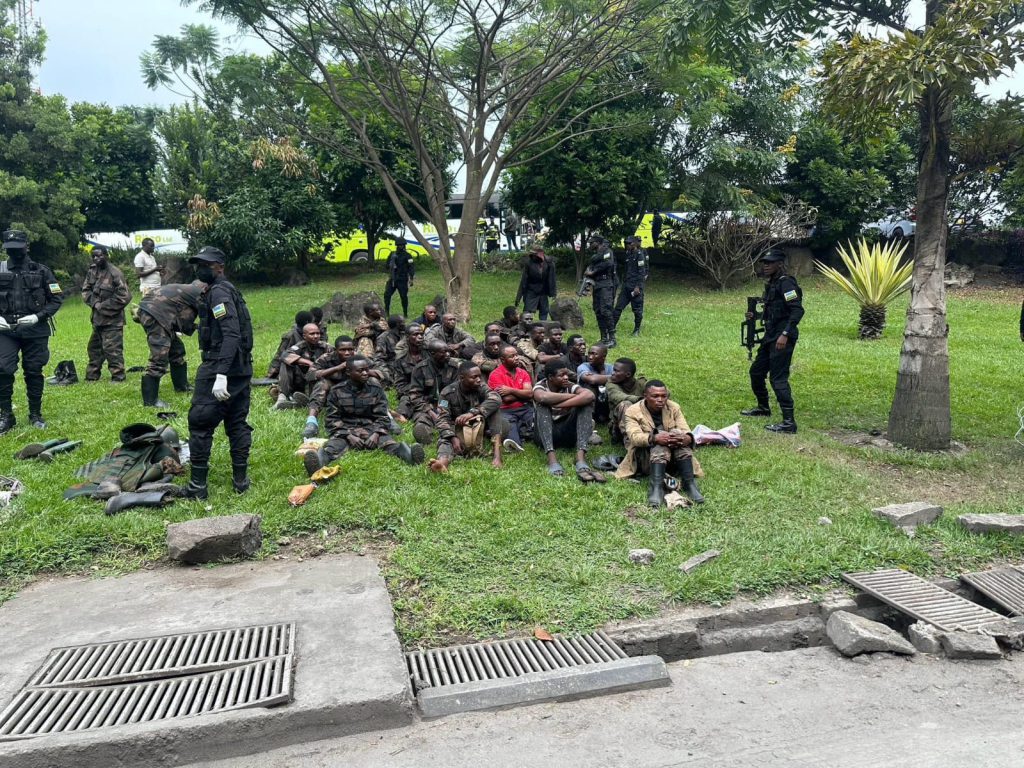By 3 a.m. Monday, Goma had fallen. The city’s control shifted to M23, a disciplined and battle-hardened force that had defied the odds and the demands of the UN Security Council, which had dismissed their grievances and called for their disarmament just hours earlier. By dawn, M23 had secured the city, their fighters patrolling the streets while the remnants of FARDC, the Congolese army, fled in disarray.
FARDC soldiers, many in tattered uniforms, made their way to the Rwandan border, hands raised in surrender. They sought safety in the one place they knew would offer them protection—Rwanda. Exhausted, thirsty, malnourished, and terrified, they were processed with dignity by Rwandan soldiers. Each soldier was disarmed, given food, water, and medical supplies to treat injuries or illnesses. They were offered showers to wash off months of grime, and clean clothes to replace their worn-out uniforms. Hundreds of defected FARDC soldiers found a place to rest after their harrowing ordeal. “We expected to be treated like prisoners,” one FARDC soldier admitted, “but we were treated like human beings.”
MONUSCO, the UN peacekeeping force, was among the first to surrender. They crossed into Rwanda, visibly shaken by the intensity of the fighting. Yet, they were received with dignity. Rwandan Police and Military personnel ensured their safety, offering them shelter and preferential treatment. “We were welcomed like guests, not like failures,” said a MONUSCO officer. “It was unexpected, but we are grateful.”
Meanwhile, the streets of Goma reflected a mix of relief and tension. For some residents, M23’s arrival was a welcome reprieve. “They’ve brought order,” said Jean-Pierre, a shopkeeper who had witnessed weeks of FARDC shelling in civilian areas. “At least now we can breathe.” Celebrations erupted in parts of the city, with residents chanting and singing praises for M23.
But not everyone was at ease. In some corners, fear lingered. Residents sympathetic to FARDC offered soldiers civilian clothes to help them blend in and escape M23’s house-to-house searches. The situation remained fragile, with pockets of gunfire occasionally breaking the uneasy calm.
In the hills near Goma, the FDLR, infamous for their role in the 1994 Rwandan Genocide, regrouped after their FARDC allies abandoned them. Armed with stolen ammunition, they launched desperate counterattacks, firing rockets and mortars. Some of these projectiles strayed into Rwandan airspace, but they were intercepted mid-air by Rwanda’s advanced defense systems. Residents of Rubavu, the Rwandan border town, watched as the skies lit up with defused bombs, cheering with each successful interception. “One down!” they counted. “Two down! Three down!”
Despite the tension across the border, life in Rubavu remained remarkably normal. Shops opened as usual, and children played in the streets. “We trust our soldiers,” said Claudine, a Rubavu resident. “They’ve kept us safe, even when we can hear the gunfire at night.”
At the border, Rwanda’s response was a study in efficiency and compassion. Refugees from Goma were processed swiftly, given food, water, and medical attention. Rwandan agencies worked tirelessly to ensure everyone’s safety, from fleeing civilians to defecting FARDC soldiers. “We don’t see enemies,” said a Rwandan official overseeing the operation. “We see people in need.”
The humiliation of FARDC extended to their international allies. European mercenaries surrendered to M23, fearing that Rwanda would hand them over to the ICC. But their fate is not yet determined, M23 isn’t going to send them back home with medals of honour. South African troops, deployed with advanced weaponry, found themselves outmaneuvered and demoralized, firing aimlessly in open spaces far from Goma. Their defeat was a stark reminder that resources alone do not win wars. The humiliation is immense. They have no idea what to do next, even though M23 said it hasn’t closed doors to those surrendering.
In Kinshasa, President Félix Tshisekedi convened an emergency meeting in the dead night, scrambling to save face. His spokesperson, Patrick Muyaya, demoralized and fatigued, issued a hollow statement claiming that FARDC had “strategically withdrawn” to avoid civilian casualties—a claim widely mocked as a desperate attempt to mask their catastrophic defeat.
Burundi, whose soldiers had fought alongside FARDC, was eerily silent. Thousands of Burundian troops had been killed, and many more captured. President Évariste Ndayishimiye, who had previously denied deploying his forces, now faced the unenviable task of explaining the losses to his people.
The West’s hypocrisy was on full display. Despite acknowledging the genocide against the Tutsi, Western powers continued to back FARDC and its FDLR allies, turning a blind eye to the atrocities committed against Tutsi communities in Congo. “If these were white people being roasted and eaten in public, the world would burn with outrage,” said an M23 commander. “But because it’s us, it’s just another African war.”
Meanwhile, East African Community Chairman William Ruto announced he would convene a meeting between President Kagame and President Tshisekedi within 48 hours to discuss the crisis. His statement was vague, offering little hope of a concrete resolution, but he at least secured both leaders’ attendance. For many observers, this was a glimmer of diplomacy in an otherwise bleak situation.
As M23 solidified its control over Goma, the question of their next move loomed large. Would they push further into eastern Congo, establishing an independent state? Or would they sit at the negotiating table, demanding the legitimacy they have long been denied?
For now, the region holds its breath. Rwanda’s borders are fortified, its soldiers vigilant. The world watches, but as always, not everyone sees. Those who do understand that the stakes are higher than ever, and the consequences of provocation could reshape the region forever.
